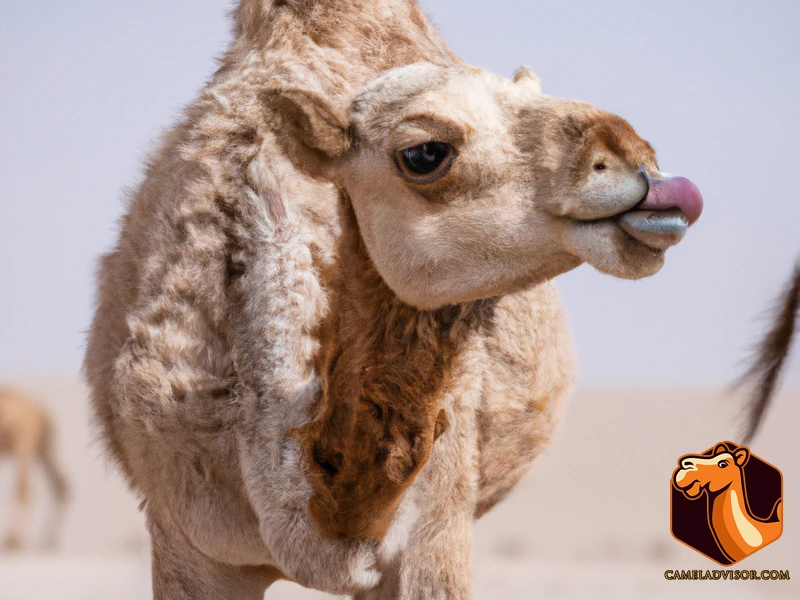The birth of a newborn camel is undoubtedly an exciting event for any farmer, but it can also bring about plenty of concerns and challenges. Many common health problems faced by these little ones can be detrimental to their survival if not identified and addressed promptly. From dehydration issues to infections and overfeeding, there are several factors that can impact the health of a newborn camel. Fortunately, with proper care and attention, many of these problems can be prevented or treated. In this article, we’ll explore some of the most common health problems faced by newborn camels and their solutions.
Contents
- Dehydration Issues
- Malnutrition Concerns
- Infections and Diseases
- Overfeeding and Obesity
- Heat Stroke and Exhaustion
- Conclusion
-
Frequently Asked Questions
- What are some common signs of dehydration in newborn camels?
- What milk supplements can I give to a dehydrated newborn camel?
- What kind of camel milk substitutes can you use for malnourished newborn camels?
- What are some common infections that can affect newborn camels?
- How often should I take my newborn camel for regular checkups and vaccinations?
- What kind of antibiotics and probiotics can be used to treat infections in newborn camels?
- Can newborn camels be overfed?
- How can I prevent heat stroke and exhaustion in newborn camels?
- How can I control the diet of my newborn camel?
- What is the recommended cooling technique for newborn camels?
- References
Dehydration Issues

As newborn camels are introduced to the harsh desert environment, dehydration can be a common issue they face, which can cause a whole host of other health problems. It is important for camel owners to be aware of the signs of dehydration in newborn camels, as well as to know the solutions to help prevent and treat it. Proper hydration can mean the difference between life and death for these delicate creatures. In this article, we will discuss in detail the dehydration issues faced by newborn camels and their solutions. For more information on caring for newborn camels, see our article on newborn camel care.
Solution: Rehydration
When a newborn camel is suffering from dehydration, it is important to rehydrate them as soon as possible. Dehydration can be caused by several factors, including hot weather, insufficient milk intake, and diarrhea.
To rehydrate a baby camel, it’s important to give them small but frequent doses of water at regular intervals. This can be done by using a bottle or a bucket with a teat attached. It’s important not to overfeed them as it can lead to more health issues.
In addition to water, electrolytes should also be given to replenish the minerals and salts lost due to dehydration. There are several commercial electrolyte supplements available in the market specifically designed for newborn camels.
If the dehydration is severe, the baby camel may need fluids administered subcutaneously or intravenously by a veterinarian.
To prevent dehydration, it’s essential to keep the baby camel in a cool and shaded environment with a good humidity level, especially in hot weather. Keeping mother and baby together is also crucial as the mother’s milk contains a high amount of water.
Internal Link: Keeping your newborn camel healthy: A veterinarian’s recommendation
Solution: Milk Supplements
One of the common health problems faced by newborn camels is dehydration. If a camel calf is not able to take in enough milk from its mother, it can quickly become dehydrated. In such cases, milk supplements can be very helpful in providing the necessary nutrition to the calf. These supplements can be in the form of powdered milk or milk replacers designed specifically for young camels, which are available in most pet stores.
Milk supplements should only be used under the guidance of a veterinarian, who can recommend the right type and amount of supplement according to the calf’s age, weight, and health condition. It is also important to ensure that the supplement is prepared and administered properly to avoid any health complications.
Here is an example table of some popular milk supplements for newborn camels:
| Product Name | Age Range | Ingredients | Benefits |
|---|---|---|---|
| Milk Matrix 33/40 | 0-40 days | Whey protein, soy oil, vitamins, minerals | Highly digestible, promotes growth and immunity |
| Ralston High Calf Milk Replacer | 0-60 days | Whey protein, animal fat, vitamins, minerals | Fortified with essential nutrients, supports weight gain |
| Sav-A-Caf Ultra 24 Multi-Species Milk Replacer | 0-30 days | Whey protein, animal fat, probiotics, vitamins, minerals | Enriched with beneficial bacteria, easy to digest |
It is always best to start supplementing the calf’s milk intake only after ruling out any serious underlying health problems. To prevent dehydration and malnutrition, it is crucial to ensure that the calf is offered the opportunity to nurse frequently and has access to clean water.
If you need more information about feeding newborn camels, you may find useful our article on feeding schedule for newborn camels and weaning.
Malnutrition Concerns
Caring for a newborn camel comes with a lot of challenges, especially when it comes to ensuring they are receiving proper nutrition. Newborn camels are vulnerable to malnutrition due to various reasons such as weak digestive systems, non-availability of mother’s milk, and lack of proper supplements. This can lead to stunted growth and development, as well as other health issues. In this section, we will discuss some of the most common malnutrition concerns faced by newborn camels, and the solutions to tackle them effectively. It is crucial to address these issues promptly to ensure the health and well-being of the young camels. For more information about bottle feeding newborn camels, click here.
Solution: Camel Milk Substitutes
Malnutrition is a common health issue faced by newborn camels, but camel milk substitutes can serve as a solution to this problem. These substitutes are available in the market and they provide an effective alternative to camel milk. They contain a range of essential nutrients such as proteins, carbohydrates, and minerals, which are important for the growth and development of the newborn camel.
Here is a table comparing some of the commonly used camel milk substitutes:
| Camel Milk Substitute | Advantages | Disadvantages |
|---|---|---|
| Goat Milk | High in protein and lactose | Can cause diarrhea and digestive issues in some camels |
| Cow Milk | Rich in essential nutrients | Difficult for camels to digest; often causes diarrhea and other digestive problems |
| Soy Milk | Low in fat and lactose; suitable for lactose-intolerant camels | May have an unpleasant taste that camels do not like |
| Commercial Milk Replacer | Formulated with essential nutrients; easy to digest | Expensive compared to other alternatives |
It is important to note that while camel milk substitutes can be a great alternative to camel milk, they should not be used as a permanent replacement. Camel milk is still the best source of nutrition for newborn camels, and substitutes should only be used in cases where camel milk is not available or there are concerns about the quality of the milk.
If you are struggling to find camel milk or an appropriate substitute, it is important to seek professional assistance right away to prevent malnutrition and other complications in the newborn camel.
Solution: Antibiotics & Probiotics
Antibiotics and probiotics are vital for treating malnutrition concerns in newborn camels. Malnutrition can lead to stunted growth, weak immune systems, and an increased risk of infections. Antibiotics can help to control and prevent infections, while probiotics can improve the overall digestive function of the camel.
Antibiotics: When a newborn camel is not getting enough nutrition from its mother’s milk or is exposed to unsanitary conditions, it is at risk of developing infections. Antibiotics can be given to treat existing infections or as a preventative measure to control any infections that may arise. However, it is essential to consult with a veterinarian before administering antibiotics as overuse can lead to antibiotic-resistant infections.
Probiotics: Probiotics can help to improve the digestive function of newborn camels. These are microorganisms that benefit the gut health of the camel, and they are often given as supplements to help with nutrient absorption. Probiotics can help prevent the growth of harmful bacteria in the camel’s gut, which can lead to infections.
It’s important to note that antibiotics and probiotics are not a substitute for proper nutrition. Newborn camels require adequate nutrition from their mother’s milk as it contains essential nutrients and helps boost their immune system. Adequate colostrum intake is especially important for newborn camel health, as it contains antibodies that the camel needs to fight infections. To avoid infections, it is important to create a clean and hygienic environment and prevent exposure to unsanitary conditions.
For more information on preventing infections in newborn camels, refer to our article on preventing infections in newborn camels. If you need help taking care of a newborn camel, our article on newborn camel help can provide valuable insights.
Infections and Diseases

As with any young animal, newborn camels face various health obstacles in the first few weeks of their lives. Among these are infections and diseases, which can quickly become life-threatening if not addressed promptly. It is important for camel owners to take proactive measures to protect their livestock from illness, including regular check-ups and vaccinations, as well as quarantine and hygiene protocols. Without proper care, even minor infections can quickly become major health concerns that put the entire herd at risk. To learn more about the importance of protecting newborn camels from disease, check out our article on the significance of colostrum or how to create a healthy training environment.
Solution: Regular Checkups & Vaccinations
Regular health checkups for newborn camels are important for early detection and prevention of diseases. Vaccinations are also a crucial part of preventive healthcare for camels as they help protect them against common diseases. It is recommended that camel owners should take their newborn camels for regular checkups at least twice a year. During these checkups, a qualified veterinarian should conduct a thorough examination of the animal to ensure that it is healthy and does not have any underlying health conditions.
The checkup should include a physical examination of the camel’s body, checking the eyes, mouth, and nose, as well as taking its temperature and checking its feces for any signs of illness. Any abnormality found in the checkup should be addressed promptly by the veterinarian.
In addition to regular checkups, vaccinations are necessary to protect newborn camels from common diseases. The types of vaccinations needed will depend on the area and climate the camel is living in. Vaccines can be administered orally or through injection, and they should be given according to the vaccination schedule recommended by the veterinarian.
Regular checkups and vaccinations can help prevent major health problems for newborn camels, keeping them healthy and strong for years to come. To learn more about camel care, check out our helpful guide on newborn camel training.
Solution: Quarantine & Hygiene
A crucial factor in preventing and managing infections and diseases in newborn camels is the implementation of strict quarantine and hygiene measures. These practices are specifically designed to limit the risks of transmission of infectious agents from outside sources to camel herds.
Here are some practical ways to implement quarantine and hygiene measures:
- Isolation: Isolating newborn camels from infected animals and their excretions can help reduce the risk of exposure to harmful bacteria and viruses. This can be done by keeping the newborns in a separate enclosure or room for a specific period of time.
- Cleaning and disinfection: Regular cleaning and disinfection of the environment, equipment, and tools used in camel rearing can significantly reduce the risk of infections. Before and after handling any animal, it’s crucial to wash hands with soap and water or use a sanitizing solution.
- Restricted access: Limiting the number of people who can enter the camel herd area can prevent the introduction of new diseases to the herd. Visitors and workers should be made aware of the importance of hygiene measures and follow strict protocols when entering the area.
- Vaccination: Vaccines are essential for preventing and controlling infectious diseases. Vaccines can be used to provide immunity to newborn camels and prevent the spread of infectious diseases to the rest of the herd.
- Monitoring and testing: Regular monitoring and testing of newborn camels can quickly identify any signs of disease or infection. These measures can help prevent the spread of the disease to other animals and enable early treatment of the infected camel.
By implementing these quarantine and hygiene practices, camel owners and herders can ensure the health of their herds, prevent the spread of infectious diseases, and reduce the risk of economic loss due to illness and death of their animals.
Overfeeding and Obesity
One of the lesser-known but equally concerning health problems faced by newborn camels is the issue of excessive overfeeding and obesity. While it may seem intuitive to feed them as much as they can consume, this can lead to a range of issues like joint problems, diabetes, and even heart disease. As with any animal, a controlled diet and exercise can go a long way in ensuring they remain in good health. Let’s explore some solutions to this problem.
Solution: Controlled Diet & Exercise
To prevent overfeeding and obesity in newborn camels, it’s important to establish a controlled diet and exercise routine. Here are some tips to help:
- First and foremost, it’s important to establish a feeding schedule and stick to it. This will help ensure that the camel is not overfed or underfed.
- Monitor food intake: Keep track of the amount of food the camel is consuming to ensure that it is not overeating. Avoid feeding it sugary or fatty foods, as they can contribute to obesity and other health problems.
- Encourage exercise: Regular physical activity can help prevent obesity and improve overall health. Encourage the camel to move around and play, especially if it spends a lot of time in a confined space.
- Gradually increase activity: If the camel is not used to exercising, it’s important to start slowly and gradually increase the amount of activity over time. This will help prevent injury and ensure that the camel adjusts to the new routine.
- Consider professional help: If you’re unsure how to establish a controlled diet and exercise routine for your newborn camel, consider seeking the help of a veterinarian or other animal health professional. They can provide valuable guidance and advice tailored to your specific situation.
By following these tips, you can help ensure that your newborn camel maintains a healthy weight and stays active and happy.
Heat Stroke and Exhaustion
For newborn camels, heat stroke and exhaustion can be serious health concerns. These can be caused by long exposure to high temperatures or physical overexertion. It is important for camel breeders to be aware of the signs and symptoms of heat stroke and exhaustion in newborn camels, as well as ways to prevent and treat these conditions to ensure the health and well-being of their young animals. Let’s take a closer look at some solutions that can help address these issues.
Solution: Shade & Water Availability
One of the most common health problems faced by newborn camels is heat stroke and exhaustion. In hot and dry desert climates, it can be difficult for them to stay cool and hydrated. However, one of the best solutions to this problem is to provide adequate shade and water availability.
Here are some practical ways to implement this solution:
- Shade: Providing shaded areas in the camels’ living environment can help prevent heat stroke and exhaustion. Natural shade provided by trees and foliage is ideal, but if that is not available, artificial shelters and tents can be set up to offer protection from direct sunlight. It’s important to make sure that the shade is well-ventilated to allow for proper air circulation.
- Water: Newborn camels should have access to clean and fresh water at all times. Water troughs should be checked and refilled regularly. It’s best to use shallow troughs to prevent the baby camels from accidentally drowning if they fall in while trying to drink. Additionally, adding electrolytes to the water can help keep the camel hydrated.
- Misting: Another way to keep the newborn camels cool is by misting them with water. This can be done using a hose or a sprinkler system. However, it’s important to make sure that the mist does not make the surrounding area too wet, as this can lead to damp bedding that can cause health problems.
By implementing these solutions, you can help prevent heat stroke and exhaustion in newborn camels and ensure that they stay healthy and happy.
Solution: Cooling Techniques
When a newborn camel suffers from heat stroke or exhaustion, it is important to cool their body down quickly to avoid potentially fatal consequences. Here are some cooling techniques that can be used to help the little ones:
| Technique | Description |
|---|---|
| Wet Towels | Wrap the newborn camel in cool, wet towels to lower their body temperature. Take care not to make the towels too cold. |
| Fans | Use fans to blow cool air over the newborn’s body to bring down their body temperature. |
| Misting | Spray cool water on the newborn’s body to create a cooling effect. Be careful not to soak them completely. |
| Shade | Provide a shaded area for the newborn to rest in. This will help to protect them from the sun and reduce their body temperature. |
It is important to combine these cooling techniques with sufficient hydration to prevent further dehydration. Additionally, a veterinarian should be consulted immediately if the newborn camel’s condition fails to improve.
Conclusion
In conclusion, it is important to note that newborn camels face a variety of health problems which can have long-lasting effects on their overall health and wellbeing. Many of these health problems can be prevented through proper care and attention from their owners. Regular checkups and vaccinations help prevent infections and diseases, while a controlled diet and exercise can prevent overfeeding and obesity.
Dehydration issues can be addressed through rehydration techniques and milk supplements, while malnutrition concerns can be solved through the use of camel milk substitutes and antibiotics and probiotics.
It is also important to note that preventing heat stroke and exhaustion can be achieved through ensuring shade and water availability, and using cooling techniques where necessary.
By taking steps to address these common health problems faced by newborn camels, owners can ensure that their camels lead a healthy and happy life. Additionally, owners should work closely with their veterinarian to develop a customized care plan based on their unique needs and circumstances. With the proper care, newborn camels can thrive and grow to be strong, healthy adults.
Frequently Asked Questions
What are some common signs of dehydration in newborn camels?
Some common signs of dehydration in newborn camels include dry mouth and nose, lethargy, and sunken eyes.
What milk supplements can I give to a dehydrated newborn camel?
You can give electrolyte supplements or diluted camel milk to a dehydrated newborn camel to help with rehydration.
What kind of camel milk substitutes can you use for malnourished newborn camels?
You can use milk and colostrum from other animals such as cows, goats, or sheep as a camel milk substitute for malnourished newborn camels.
What are some common infections that can affect newborn camels?
Newborn camels can be affected by various bacterial and viral infections such as Pneumonia, navel infections, and diarrhea.
How often should I take my newborn camel for regular checkups and vaccinations?
You should take your newborn camel for regular checkups and vaccinations recommended by your veterinary doctor.
What kind of antibiotics and probiotics can be used to treat infections in newborn camels?
Your veterinary doctor may prescribe antibiotics such as penicillin, tetracycline or sulfa drugs, These antibiotics are known to be safe for newborn camels. Probiotics like acidophilus, Lactobacillus, and Streptococcus species can also be used to promote a healthy digestive system.
Can newborn camels be overfed?
Yes, overfeeding can cause obesity and other health problems in newborn camels.
How can I prevent heat stroke and exhaustion in newborn camels?
To prevent heat stroke and exhaustion, make sure your newborn camel has access to shade and water at all times, Also, regular spraying or showering with water can help to keep them cool.
How can I control the diet of my newborn camel?
Feeding portion control, having a set mealtime, and limiting treats can help to control the diet of newborn camels.
What is the recommended cooling technique for newborn camels?
Recommended cooling techniques include evaporative cooling which involves spraying or showering with water or utilizing fans or misters.







